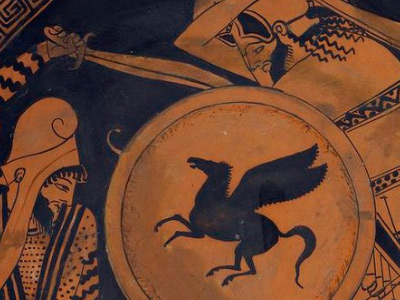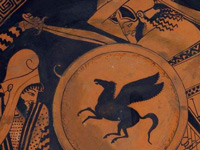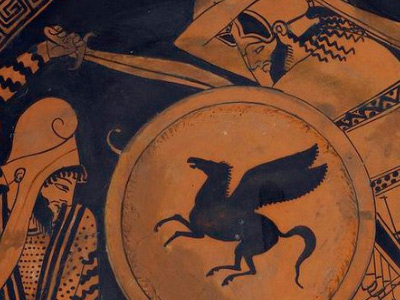Battle of Plataea (479 BC)

The Battle of Plataea was the final land battle during the second Persian invasion of Greece. It took place in 479 BC near the city of Plataea in Boeotia, and was fought between an alliance of the Greek city-states (including Sparta, Athens, Corinth and Megara), and the Persian Empire of Xerxes I.
The previous year the Persian invasion force, led by the Persian king in person, had scored victories at the battles of Thermopylae and Artemisium and conquered Thessaly, Boeotia, Euboea and Attica. However, at the ensuing Battle of Salamis, the Allied Greek navy had won an unlikely but decisive victory, preventing the conquest of the Peloponnesus. Xerxes then retreated with much of his army, leaving his general Mardonius to finish off the Greeks the following year.
In the summer of 479 BC the Greeks assembled a huge (by ancient standards) army and marched out of the Peloponnesus. The Persians retreated to Boeotia and built a fortified camp near Plataea. The Greeks, however, refused to be drawn into the prime cavalry terrain around the Persian camp, resulting in a stalemate that lasted 11 days. While attempting a retreat after their supply lines were disrupted, the Greek battle line fragmented. Thinking the Greeks in full retreat, Mardonius ordered his forces to pursue them, but the Greeks (particularly the Spartans, Tegeans and Athenians) halted and gave battle, routing the lightly armed Persian infantry and killing Mardonius.
A large portion of the Persian army was trapped in its camp and slaughtered. The destruction of this army, and the remnants of the Persian navy allegedly on the same day at the Battle of Mycale, decisively ended the invasion. After Plataea and Mycale the Greek allies would take the offensive against the Persians, marking a new phase of the Greco-Persian Wars. Although Plataea was in every sense a resounding victory, it does not seem to have been attributed the same significance (even at the time) as, for example, the Athenian victory at the Battle of Marathon or the Spartan defeat at Thermopylae.
Significance
Plataea and Mycale have great significance in ancient history as the battles that decisively ended the second Persian invasion of Greece, thereby swinging the balance of the Greco-Persian Wars in favour of the Greeks. They kept Persia from conquering all of Greece, although they paid a high price by losing many of their men. The Battle of Marathon showed that the Persians could be defeated, and the Battle of Salamis saved Greece from immediate conquest, but it was Plataea and Mycale that effectively ended that threat. However, neither of these battles is nearly as well known as Thermopylae, Salamis or Marathon. The reason for this discrepancy is not entirely clear; it might, however, be a result of the circumstances in which the battle was fought. The fame of Thermopylae certainly lies in the doomed heroism of the Greeks in the face of overwhelming numbers; and Marathon and Salamis perhaps because they were both fought against the odds, and in dire strategic situations. Conversely, the Battles of Plataea and Mycale were both fought from a relative position of Greek strength, and against lesser odds; the Greeks, in fact, sought out battle on both occasions.
Militarily, the major lesson of both Plataea and Mycale (since both were fought on land) was to re-emphasise the superiority of the hoplite over the more lightly armed Persian infantry, as had first been demonstrated at Marathon. Taking on this lesson, after the Greco-Persian Wars the Persian empire started recruiting and relying on Greek mercenaries. One such mercenary expedition, the "Anabasis of the 10,000" as narrated by Xenophon, further proved to the Greeks that the Persians were militarily vulnerable even well within their own territory, and paved the way for the destruction of the Persian Empire by Alexander the Great some decades later.
HISTORY

RESOURCES
This article uses material from the Wikipedia article "Battle of Plataea (479 BC)", which is released under the Creative Commons Attribution-Share-Alike License 3.0.
© Stories Preschool. All Rights Reserved.









